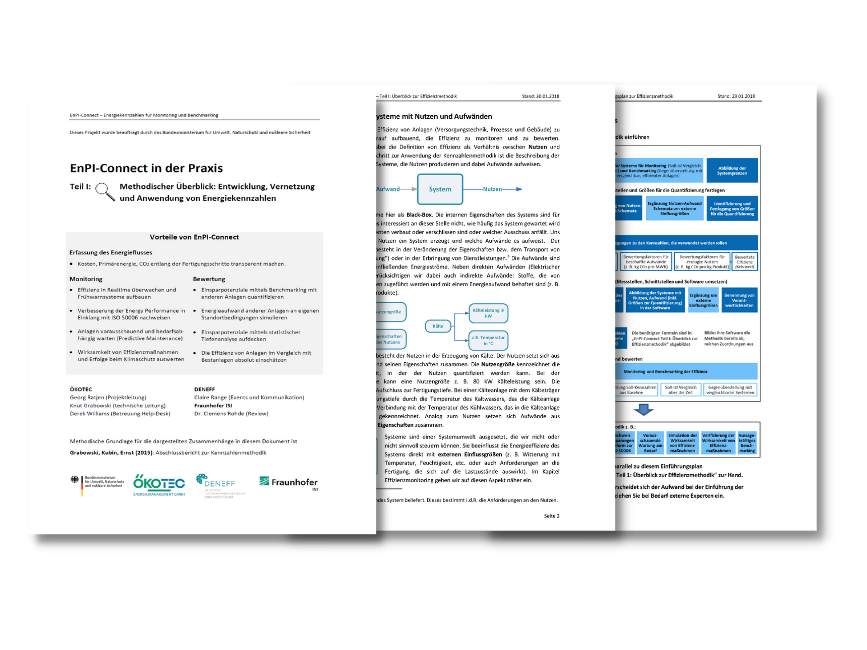Making efficiency transparent
Energy performance indicators
How do you know if your systems are energy efficient or if measures to reduce energy demand at your company are having the desired effect? These are increasingly common questions. At the same time, companies are facing growing pressure to introduce or improve their sustainability reporting; stakeholders wish to see facts and figures that demonstrate climate action. ÖKOTEC has developed a system of energy performance indicators that allows companies to reliably monitor and assess their energy consumption, energy costs, and carbon emissions.

ISO 50001 – Energy Management Systems
Demonstrating continuous improvement with performance indicators
Companies with an ISO 5001 certified energy management system are required to demonstrate continuous improvement in energy efficiency based on reliable metrics.
- How can I demonstrate improvements in line with ISO 50001?
- How can I reliably monitor and evaluate energy efficiency?
- What criteria must be fulfilled for the certified monitoring and evaluation of efficiency?
- How can I quantify potential savings using benchmarks?
- How can I evaluate the effectiveness of efficiency measures?
ÖKOTEC has answers to these and many other questions. Make the most out of your energy management system by working with us.
EnEffCo® Consultant
Daniel Kibscholl
“An energy management system without performance indicators is like the Olympics without a stopwatch or measuring tape.“

Methodological guide for energy managers
Optimizing your efficiency, step-by-step
The German Environmental Ministry publishes a practical guide on how to use energy performance indicators. Developed in cooperation with ÖKOTEC, DENEFF, and Fraunhofer ISI, the guide is geared towards companies with an ISO 50001 energy management system who wish to refine their monitoring system and boost the efficiency of their business activities. The guide places a central focus on the adoption of the energy performance indicators (EnPIs) developed by ÖKOTEC and DENEFF on behalf of the German Environmental Ministry. It also discusses ISO 5006, which provides practical assistance with establishing, using, and maintaining EnPIs as part of an ISO 50001 energy management system. We show you how to achieve continuous optimization with a step-by-step process, including:

- Determination of efficiency targets and system boundaries
- Data acquisition (input measurement/baselines)
- Implementation of energy efficiency measures
- Analysis for confirming measure effectiveness
- Reporting
Practical Guides (German)
Scientific foundation (German)

Best-Practice Case Studies
Funded by the German Environmental Ministry, the EnPI-Connect project was dedicated to the further development of ÖKOTEC’s indicator methodology. The EnPI methodology was tested in combination with the energy management software EnEffCo® at three different companies: Mercedes-Benz Berlin; the food manufacturer Stockmeyer; and the laundry services provider City Clean. The project partners realized considerable energy savings thanks to the optimization of their various energy, production, and utility systems.
Presentations from the project partners
Energy performance indicators in practice
Benefits and use cases for energy performance indicators
Monitoring

Benchmarking

Integration and CO2-Footprint

Reporting

Our Services
EnPI Workshop
Systematically improving efficiency
Our EnPI Workshop provides a practical introduction to the methodology behind our energy performance indicators. Our experienced team teaches participants how to introduce energy performance indicators at their company, including how to model optimization potential and demonstrate efficiency improvements in line with relevant norms. Our experts have many years of experience with ISO 50015 and 50006 and their implementation.
- Workshop preparation, implementation, and follow-up, including documentation
- Analysis and assessment of current energy data collection methods and metrics
- Presentation of EnPI methodology
- Methodological application in connection with one or more Significant Energy Users (SEU)
- Identification of optimization potential and coordination of next steps
- For customers with EnEffCo software®: Implementation of EnPIs and system monitoring in EnEffCo®

Energy efficiency monitoring with EnEffCo®
Energy efficiency and the digital transformation
ÖKOTEC has been dedicated to improving energy efficiency with the power of digital technologies since 2004. Our proprietary software for energy efficiency monitoring is the product of many years of experience with energy performance indicators and their real-world application.
Webinar
Verification of continuous improvement in line with ISO 50001
Companies around the globe have been implementing the ISO 50001 standard to systematically track their energy consumption and achieve greater efficiency. In the webinar at right, Jochen Buser of GUTcert and Georg Ratjen of ÖKOTEC provide a practical overview of the ISO 50001 standard. (This video is available in German)



